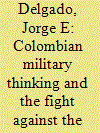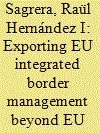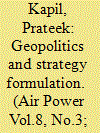| Srl | Item |
| 1 |
ID:
141152


|
|
|
|
|
| Summary/Abstract |
This article attempts to place in historical perspective the latest effort by Colombia’s military (Colmil) to defeat the now half century old insurgency of the Fuerzas Armadas Revolucionarias de Colombia – Ejército del Pueblo (FARC-EP). It argues that the ‘surge’ initiated under President Álvaro Uribe in 2002 with the assistance of the United States can only be fully analyzed in the context of the Colmil’s intellectual framework for counter-insurgency. Specifically, this article will explain how the protracted engagement with counter-insurgency has shaped the Colmil’s understanding of the nature of the conflict, as well as its attitudes towards its adversary, civil authority and the instrumentality of force. An understanding of the Colmil’s strategic tradition can also help to explain their apprehensions about the ongoing peace negotiations with the FARC-EP.
|
|
|
|
|
|
|
|
|
|
|
|
|
|
|
|
| 2 |
ID:
129583


|
|
|
|
|
| Publication |
2014.
|
| Summary/Abstract |
External action has been of growing importance for the Union's Area of Freedom, Security and Justice (AFSJ) and accounted in 2011 already for over 19 per cent of all texts adopted by the Justice and Home Affairs Council. AFSJ related external action has also added a new dimension to previously existing fields of EU external relations. This article first considers the internal and external factors which have influenced the development the external side of the AFSJ and the impact of the post-Lisbon legal and institutional framework, including the special context created by the 'opt-outs' and coherence problems within this framework. It then provides a survey and analysis of the main forms of EU action in this domain (strategy formulation, cooperation with third countries, capacity-building and cooperation with and within international organizations) before assessing-in the conclusions-the implications of this external dimension for both the EU and the Member States and its future developments prospects.
|
|
|
|
|
|
|
|
|
|
|
|
|
|
|
|
| 3 |
ID:
129584


|
|
|
|
|
| Publication |
2014.
|
| Summary/Abstract |
The external dimension of European Union (EU) border management cooperation has recently been developed, in particular through the promotion of integrated border management (IBM). The European Commission has been keen to foster IBM, an attempt to reach EU standards in the absence of an EU common border service. Integrated border management is regulated under the Treaty of Lisbon, and the Stockholm Programme calls for its further development. This article analyses and compares the policy instruments promoting IBM standards beyond EU borders, namely the European Agency for Operational Cooperation at the External Border of the Member States of the EU (FRONTEX) (with the signature of Working Arrangements with the border services of third countries) and the activity of the EU Border Assistance Mission to the Republic of Moldova and to Ukraine (EUBAM) at the Ukrainian-Moldovan border. Moreover, it provides an empirical account of IBM activity carried out in the Eastern Partnership and Russia, and explains the reasons underlying the lack of IBM promotion in the southern Mediterranean countries.
|
|
|
|
|
|
|
|
|
|
|
|
|
|
|
|
| 4 |
ID:
128324


|
|
|
|
|
| Publication |
2013.
|
| Summary/Abstract |
Is there a limit to human will? Is geography a constraint or a legitimate determinant which checks human zeal? Are political geographers overtly deterministic in their analyses and detached to the possibilities of human capabilities? Or are they prudent realists who see the world as it is and not how it should be? These questions from the essence of the use of geopolitics in strategy formulation. It is often rued that American power oscillates among the Vietnam psyche of interventionism, regime change, human rights and promulgation of the liberal international system even at stretched cost. The wars of Iraq and Afghanistan are symptomatic of the former while the Yugoslavian war intervention was symptomatic of the latter. Renowned strategist Robert D Kaplan argues that while there are many human process at work, such extremes can be avoided if nations priorities one major factor in their calculation: geography.
|
|
|
|
|
|
|
|
|
|
|
|
|
|
|
|
| 5 |
ID:
193160


|
|
|
|
|
| Summary/Abstract |
This paper to uncovers how leaders practice emergent strategy as a core strategic philosophy. The article uses the case of general and statesman Moshe Dayan as a principal case study to uncover leadership and management practices of emergent strategy. Following a discussion on the emergent versus deliberate strategy schools, I show why Moshe Dayan as a leader can be considered as an archetype of the emergent approach worth studying. I then present six leadership principles that enabled him to practice the emergent approach. The article concludes with discussion of the limitations and value of the emergent approach for leaders today.
|
|
|
|
|
|
|
|
|
|
|
|
|
|
|
|